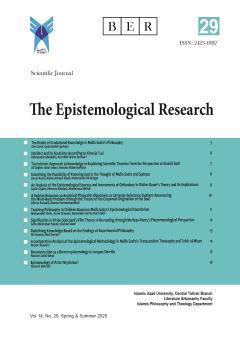Redefining Knowledge Based on the Findings of Experimental Philosophy
Subject Areas : Epistemological researches
1 - PhD student of Philosophy of Science, Faculty of Law, Theology, and Political Science, Science and Research Branch, Islamic Azad University, Tehran, Iran.
2 - Assistant Professor, Islamic Azad University, Science and Research Branch of Tehran
Keywords: Gettier Cases, Experimental Philosophy, Traditional Analysis of Knowledge, Reliabilism, Pragmatism,
Abstract :
Since the publication of Gettier cases, the traditional definition of knowledge as "justified true belief" has faced a significant challenge. Although numerous responses have been given to this challenge over time, it became even more complex for experimental philosophers, a new group of philosophers who expanded their activities in the second decade of the present century. The reason for this added complexity was the reliance of traditional philosophers on intuition when confronting Gettier cases, while experimental philosophers regarded intuition as highly questionable.
As a result, experimental epistemology emerged, focusing on the investigation of intuition and the definition of knowledge. Based on the findings of these studies, one could radically claim that, contrary to the prevailing definition, propositional knowledge is merely justified belief, and truth—regardless of how it is defined—is not part of the definition of knowledge. Alternatively, in a more conservative claim, one might argue that ordinary people, when considering the nature of knowledge, tend to support a form of reliabilism.
شمس، منصور. (1392). آشنایی با معرفتشناسی، چاپ سوم. تهران: انتشارات طرح نو.
Beebe, J. R. (2023). Experimental Epistemology: Knowledge and Gettier Cases. The Compact Compendium of Experimental Philosophy, 163.
Geffner, Jennifer. (2012). Reliabilism: A Response to the Gettier Problem. Colgate Academic Review, Vol. 2, Article 8.
Gettier, E. (1963). Is knowledge justified true belief? Analysis, 23(6), 121-123.
Goldman, Alvin. (2006). What is Justified Belief. In Reading Epistemology. Edited by Sven Bernecker. Malden: Blackwell.
Goldman, Alvin و Bob Beddor. (Summer 2021 Edition). Reliabilist Epistemology. The Stanford Encyclopedia of Philosophy. Edward N. Zalta (ed.). URL: https://plato.stanford.edu/archives/sum2021/entries/reliabilism/.
Horwich, P. (2020). Wittgenstein on truth. WITTGENSTEINIAN (adj.) Looking at the World from the Viewpoint of Wittgenstein's Philosophy, 151-162.
Ichikawa, Jonathan Jenkins و Matthias Steup. (Fall 2024 Edition). The Analysis of Knowledge. The Stanford Encyclopedia of Philosophy. Edward N. Zalta & Uri Nodelman (eds.). URL: https://plato.stanford.edu/archives/fall2024/entries/knowledge-analysis/.
Knobe, Joshua و Shaun Nichols. (Winter 2017 Edition). Experimental Philosophy. The Stanford Encyclopedia of Philosophy. Edward N. Zalta (ed.). URL: https://plato.stanford.edu/archives/win2017/entries/experimental-philosophy/.
Ney, A. (2008). Physicalism as an Attitude. Philosophical Studies, 138, 1-15.
Popper, K. R. (1979). Objective Knowledge: An Evolutionary Approach (Vol. 49). Oxford: Clarendon Press.
Pust, Joel. (Summer 2019 Edition). Intuition. The Stanford Encyclopedia of Philosophy. Edward N. Zalta (ed.). URL: https://plato.stanford.edu/archives/sum2019/entries/intuition/.
Shook, John R. (2023). Pragmatism. MIT Press.
Weinberg, J. M., Nichols, S. و Stich, S. (2001). Normativity and Epistemic Intuitions. Philosophical Topics, 29(1/2), 429-460.


